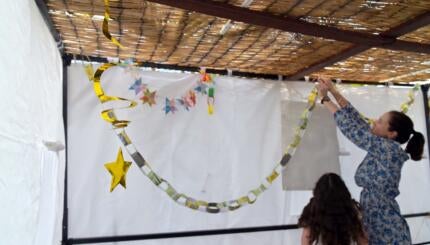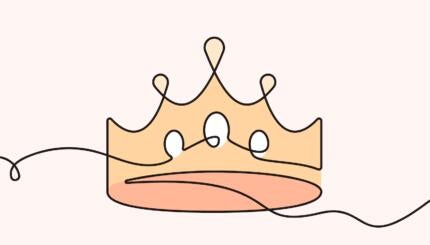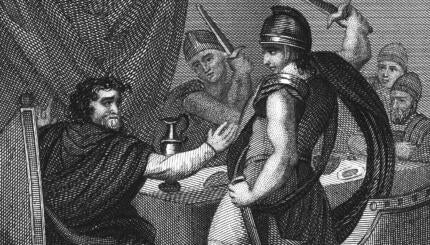This past Shabbat my daughter became a bat mitzvah. I cried and kvelled as she made our family and our community proud. Her bat mitzvah learning path was different than most of her peers since both her parents are rabbis. My wife taught her to lead prayers, and I studied the Torah portion with her and guided her to write a d’var Torah.
Studying with my daughter reminded me how much each of us brings our own perspective to reading Torah. She showed no interest in any verse I found fascinating, but we found a rhythm. After reading through the portion verse by verse, she selected two verses about the requirement for two or three witnesses to convict someone for capital punishment. We explored a wide variety of commentaries and finally, having seen the breadth of interpretation, she drafted a d’var Torah about capital punishment.
Along the way, a new question began to trouble me. Whatever might happen on the bimah that day, would it reflect on my wife and I as her parents? Would everyone think about how her actions were a reflection of how she was raised? Or alternatively, would everyone attribute her accomplishments largely to her? After all, my wife and I conceived her (a painful, expensive process of multiple IVF rounds), raised her (making thousands of little and big decisions along the way) and directed her on the path to becoming an adult Jew. On the other hand, she is the one who did the learning, who took on this opportunity and who ultimately led and taught the community.
The question of who is ultimately responsible for the behavior of a child, whether positive or negative, is an ancient one, and it appears in stark form in this week’s Torah portion: “Parents shall not be put to death for children, nor children be put to death for parents: they shall each be put to death only for their own crime” (Deuteronomy 24:16).
With your help, My Jewish Learning can provide endless opportunities for learning, connection and discovery.
What might seem like a no-brainer was probably an ethical revolution in its time. Contrary to the practice in surrounding cultures, the Torah asserted that if a child does something deserving of capital punishment, the parent cannot be punished. (And vice versa: A child cannot be punished for a parent’s abhorrent behavior.) Perhaps surprisingly, this question that many of us thought was settled has become a live one in our own day. In the wake of school shootings by minors, a new legal trend has emerged: charging their parents with involuntary manslaughter. Just a few months ago, the parents of a Michigan school shooter were found guilty of involuntary manslaughter. And last week, the father of the school shooter at Apalachee High School in Georgia was charged with multiple crimes, including involuntary manslaughter and second-degree murder. It seems our society is re-examining the age-old question of who is responsible for the behavior of a young person. We are asking anew: Where is the boundary between childhood and adulthood?
Jewish tradition offers an answer in the form of a brief ritual for parents of a bar or bat mitzvah. The ritual first appears in an ancient midrash (Genesis Rabbah 63:10). The rabbis note how differently Isaac’s sons Jacob and Esau turned out as adults, even though they shared a womb and grew up in the same household. For 13 years, the rabbis explain, Jacob and Esau went to school. But at age 13, it became clear that one would graduate to the house of study and the other would pursue idolatry. The midrash compares the boys to a myrtle and a thorn bush that grew up near each other. Upon maturity, one produced a beautiful fragrance while the other grew thorns. (As a parent of fraternal twin boys, I witnessed a version of this first-hand: My wife and I raised our sons with the exact same parenting choices in every moment, and yet each of them became their own person, shaping our views on the nature vs. nurture debate.)
The midrash ends with a teaching by Rabbi Eleazar ben Rabbi Simeon: “A man is responsible for his son until the age of 13: thereafter he must say, ‘Blessed is the One who has now freed me from the responsibility [of the actions] of this child.’”
Surely the rabbis understood that there is no magical tipping point on a child’s 13th birthday that marks a boundary between childhood and adulthood. Like us, they knew the process was gradual. And yet, as a community and society, we need to pick a moment to acknowledge the transition, even if it doesn’t fit perfectly for every child. So the rabbis created this ritual and, in the process, made a claim that adulthood starts at age 13.
Despite the countless changes in our understanding of childhood development in the centuries since Rabbi Eleazar taught that blessing, I think the wisdom of the Torah and rabbis still stands. That doesn’t mean that every privilege of adulthood must begin at 13 — driving, voting and drinking all are properly reserved until later years. But unless they played an actual role in the crime, parents should not be punished for the actions of a child over 13, who should be held responsible for their own actions.
Standing at the bimah after watching our child read from the Torah, my wife and I recited that ancient blessing. It was moving for me because it spoke to what I was feeling — that I had done everything I could to bring her to this point. But from now on she will bear the impact of, and responsibility for, the choices she makes.
This article initially appeared in My Jewish Learning’s Shabbat newsletter Recharge on September 14, 2024. To sign up to receive Recharge each week in your inbox, click here.



